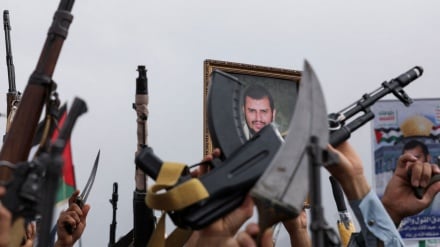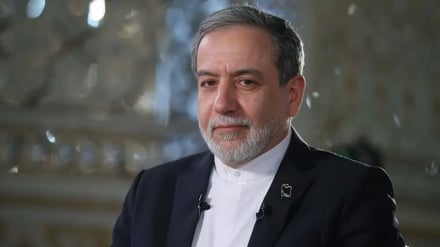Three years of Saudi imposed war on Yemen (1)
The Saudi regime has waged a war against Yemen as of March 26, 2015. This war which was expected to be short-lived, has lingered for a number of years. Today, we will study the reasons and goals of the Saudi regime in waging a war on Yemen.
The Saudi regime staged attacks and raids against Yemen on March 26, 2015, under the name of "Operation Decisive Storm". The Saudi regime has alleged that it has waged military operations against Yemeni nation upon the demand of the resigned Yemeni president, Mansour Hadi. This Saudi regime's allegation is made while Mansour Hadi had lost his legitimacy for two important reasons. On one hand, his extended presidential tenure had terminated on February 2015, and the only option for possible continuation of his presidential term was to hold elections, which Mansour Hadi administration did not arrange. Thus, he did not maintain any legitimacy for staying in power; let alone demanding a military intervention upon his behalf. On the other hand, Mansour Hadi backed down in the face of Yemen's domestic circumstances, such as mounting challenges with Ansarullah Movement and the overwhelming majority of Yemeni people, thereby opting for fleeing to the Saudi Capital, Riyadh. The fugitive president cannot urge military interference. Given these circumstances, the Saudi regime's claims in justification of its raids and offensives against the innocent and defenseless Yemeni nation are nothing but sheer lies.
Yemen is of paramount importance for the Saudi regime for a number of reasons. Yemen maintains the largest ground borderlines with Saudi Arabia, stretching to 1458 square kilometers. Yemen is also considered by the Saudi regime as the latter's backyard; and Aale Saud prefers to maintain a puppet government in Yemen. In the meantime, the developments in Yemen in the year 2014 showed the increasing role of Houthis in Yemen's power structure. Presence of Shias in northern Yemen, and in the neighborhood of Saudi southern borders has caused the Saudi regime's discontentment toward developments in Yemen. Hence, staging offensives against Yemeni nation in a bid to obstruct the reinforcement of the status of Houthis in Yemen's power structure, and to marginalize Ansarullah Movement were placed on the agenda of the Saudi regime.
Furthermore, Yemen is strategically important. Bab-el-Mandeb Strait is situated in Yemen, between the Red Sea and the Indian Ocean, and is the closest waterway between the East and the West. Given that the Saudi regime is one of the main exporters of oil in the world, it attaches significant importance on Bab-el-Mandeb Strait. This strait is important for international maritime trade and shipping, and is considered as a lifeline for trade in Asia, Europe, and Africa, accounting for two thirds of global maritime trade. In addition to the strategic Bab-el-Mandeb Strait; the Gulf of Aden is also situated in Yemen, adding to the significance of developments in that country. Meanwhile, the developments in Yemen in the year 2014 generated concerns within the Saudi regime over the instatement of a government in Yemen opposing Aale Saud.
The developments that took place in Yemen in the years 2011 and 2014, could have directly influenced the internal conditions of Yemen. The Saudi regime is undoubtedly one of the main enemies of democracy. A change in the power structure in Yemen, and contribution of Ansarullah Movement in the power structure can, on one hand, lead to establishment of a democratic ruling system, and, on the other hand, form a model in Yemen, similar to situations in Lebanon and Iraq, based on which all religious sects contribute to the power structure. Such changes could have prompted changes in Saudi Arabia, given that currently there is no trace of democracy in Saudi Arabia, and the Saudi regime rules with an iron fist, while the overwhelming majority of Saudi nationals demand the fair distribution of power and wealth, and participation in the political scene of their country. In the meantime, the Saudi regime imposed a war on Yemen, in order to obstruct the establishment of a democratic ruling system in the neighborhood of its borders.
Moreover, the Saudi regime attacked Yemen while Salman bin Abdul-Aziz, and his son, Mohammad, had come to power in January 2015. Salman replaced Abdullah as the Saudi King, while appointing his son, Mohammad, as the Saudi minister of defense. In the meantime, Mohammad bin Salman, with the intention of displaying himself as a so-called national hero, waged war overseas on Yemen to somehow manifest the grandeur of the Saudi regime, while imagining that he could boost his popularity inside Saudi Arabia by waging a war against Shia Houthi Movement, which he expected to last less than a month.
One of the other root causes of the Saudi regime's attacks against Yemen was Aale Saud's concerns over a tilt in regional balance of power in favor of Islamic Republic of Iran. the population of Yemen stands at twenty-six million people, which is nearly tantamount to the overall populations of the five countries of Qatar, United Arab Emirates, Bahrain, Kuwait, and Oman. What signifies the importance of Yemen is its religious demographic makeup. Nearly 58% of Yemenis are Sunnis, while roughly 42% of Yemenis are Shias, accounting for eleven million people. Meanwhile, presence of eleven million Shias in Yemen, has led the Saudi regime to attach significant importance to developments in Yemen. This is because the Aale Saud believes possible empowerment of Shia groups in Yemen undermine the impact of Saudi regime, on one hand, and reinforces the influence of Islamic Republic of Iran in Yemen, on the other hand, cementing the pivot of resistance in West Asia.
Saudi regime also deployed troops to Bahrain in a bid to obstruct the empowerment of Shias in that country.
The war on Yemen is entering its fourth year while none of the goals of Saudi regime have been fulfilled. The Saudi war on Yemen was not short-lived, while the Saudi regime was discredited for attacking innocent and defenseless Yemeni people. This imposed war also fueled disputes within the Saudi regime. Furthermore, the Saudi regime's imposed war on Yemen did not depict Mohammad bin Salman as a so-called national hero, and in fact mounted domestic and global criticisms against him.
The fact of the matter is that the Saudi regime has utterly failed to reach its sinister goals in waging a war on Yemen. The Saudi regime has also been lashed out by the international community for brutally and ruthlessly attacking the innocent and defenseless Yemeni nation. Analysts believe that the Saudi regime has been bogged down in a quagmire in Yemen, and has no way out.
MR/ME


